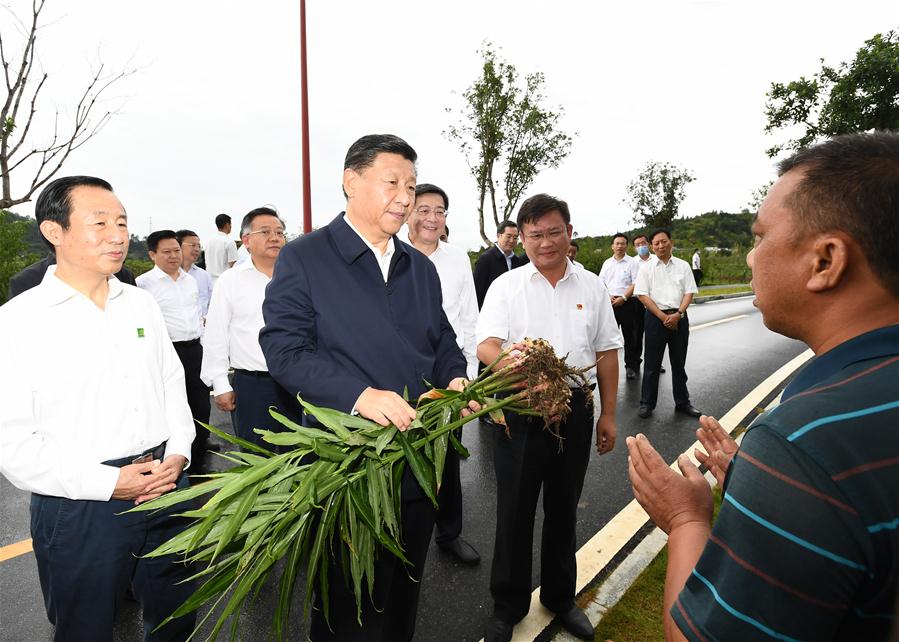Foreign news
Xi Jinping Reviews Poverty Relief Progress In Hunan As China’s War On Poverty Nears End

China has vowed to eradicate absolute poverty in rural areas by the end of 2020 despite the COVID-19 epidemic. While efforts are being made to ensure “no single poor area or individual shall be left behind” – as President Xi Jinping puts it – people that have recently shaken off poverty are striving for a better life.
Among the 529 residents in a small village in central China’s Hunan Province, 95 in 30 households used to live under the poverty line. The whole village was lifted out of poverty through rural tourism in 2018, and the average annual income of the residents reached 13,840 yuan (about 2,060 U.S. dollars) last year – way above the national poverty line of 2,300 yuan (about 340 U.S. dollars).
Shazhou Village, located in a mountainous area in Rucheng County, Chenzhou City, was the first stop of Xi’s inspection tour in Hunan.

Xi, also general secretary of the Communist Party of China (CPC) Central Committee, visited the village on Wednesday and learned about poverty relief industries and progress in consolidating poverty eradication at a modern agricultural tourism demonstration base.
Targeted poverty alleviation
China has adopted a targeted approach in in its poverty alleviation campaign, which means taking tailored relief measures to fit different local conditions.
The story of Shazhou is a prime example of that approach. The village boasts the beautiful scenery of the Luoxiao Mountains and the unique Yao ethnic culture – nearly two thirds of the residents belong to the Yao ethnic group. Tourism has played a significant role in Shazhou’s battle against poverty.
The village has promoted rural tourism and high-quality fruit planting, and arranged training programs to help villagers obtain such job skills as for restaurant cooks and rural tourism industry employees. More than 350 local jobs have been created through the efforts.
With all its residents lifted out of poverty, Shazhou has also been known for such national-level honor as the “village of beauty and leisure,” “role model for ethnic unity and progress,” “key village for promoting rural tourism” and “traditional Chinese village.”
New starting point

Since the 18th CPC National Congress in late 2012, China has achieved remarkable results in poverty reduction. More than 93 million rural people shook off poverty between 2013 and 2019.
But 5.51 million people needed to get rid of poverty by the end of 2019. And such a formidable task was coincided by accident with the coronavirus outbreak.
Speaking at a symposium on poverty alleviation in March, Xi described the goal of ending absolute poverty by 2020 as a “solemn pledge” made by the CPC Central Committee to the Chinese people, urging authorities at all levels to deliver on that promise.
As China intensifies efforts in the final stage of the tough battle, Xi tours around the country to inspect economic and social development, with poverty alleviation high on the agenda. Prior to the Hunan trip, he had taken inspection tours this year of capital city Beijing and provinces of Yunnan, Hubei, Zhejiang, Shaanxi, Shanxi, Jilin and Anhui, and Ningxia Hui Autonomous Region.
In addition to increasing poor people’s incomes, China is also striving to improve the quality of poverty relief. Xi has repeatedly called for efforts to ensure rural poor people do not have to worry about food and clothing and have access to compulsory education, basic medical services and safe housing.
Meanwhile, he is looking into the future beyond the end of poverty. “Being lifted out of poverty is not an end in itself but the starting point of a new life and a new pursuit,” he said on several occasions this year, calling for consolidating achievements in poverty alleviation and advancing the rural vitalization strategy.
Put forward at the 19th CPC National Congress in 2017, the strategy aims to build rural areas with thriving businesses, pleasant living environments, social etiquette and civility, effective governance and prosperity.
Shazhou is among many previously poor villages in China that have embarked on the journey for a better future.
From ‘saplings’ to ‘towering trees’
On Wednesday, Xi also visited a revolution-themed exhibition hall, a village service center, a clinic, a primary school and the homes of villagers in Shazhou.
The exhibition chronicles the story of an impoverished villager named Xu Jiexiu, who offered shelter to three female Red Army soldiers during the Long March in the 1930s. Upon the soldiers’ departure, they cut their only quilt in halves, leaving one part with Xu to show their care.
Xi said the CPC owes its achievements to the people’s support, vowing to further improve the people’s wellbeing.
While inspecting the village service center, he stressed the effectiveness of primary-level public services. The center should provide targeted services for local residents according their needs, he told workers there.
At the primary school, the president encouraged students to make progress every day and grow from “saplings” into “towering trees” of the Chinese nation.
(With input from Xinhua)
Foreign news
Pakistan Moves to Deepen Diplomatic, Economic Relations With Nigeria

The Government of the Islamic Republic of Pakistan has called for deeper diplomatic and economic ties with the Nigerian government to foster development for both countries.
Mr Rana Ihsaan, the Coordinator to the Prime Minister of Pakistan made the call in an interview with the News Agency of Nigeria (NAN) during his working vist to Nigeria on Wednesday in Abuja.
NAN reports that the visiting Coordinator held a closed-door meeting with Yusuf Tuggar, the Minister of Foreign Affairs.
After the meeting, he said that both both sides had agreed on deepening relations in the areas of trade and commerce, among others.
Ihsaan said that both countries must see the need to accelerate efforts towards a Bilateral Trade Agreement (BTA).
He said that Pakistan had already submitted a draft BTA and was awaiting Nigeria’s response.
According to him, discussions centered on easing visa processes, expanding educational exchanges, and strengthening Cooperation in sectors such as Minerals, Youth training, and Defence were highlighted.
Ihsaan said that Pakistan had already implemented visa-on-arrival for Nigerians at no cost, and urged Nigeria to reciprocate to enhance people-to-people ties.
He stressed the importance of high-level engagements between both nations, describing Nigeria and Pakistan as very similar countries with large populations, youthful demographics, and vast economic potentials.
“Deeper collaboration will unlock opportunities in trade, education and investment, while further solidifying long-standing diplomatic relations,” he said.
He said that aside from visiting the foriegn Minister and other top government officials in Nigeria, he was also in the country to attend the on-going West Africa Beauty Exhibition holding in Lagos.
He described the exhibition as one of the continent’s largest cosmetic fairs, adding that he led a delegation of 19 Pakistani business people exploring Nigeria’s estimated 10 million dollar beauty and cosmetics market.
Ihsaan said that Nigeria was a gateway to Africa, adding that Pakistani products, like cosmetics, Textiles, Pharmaceuticals, Food items and Sports goods were already gaining traction in the country.
He encouraged Pakistani exhibitors to establish offices, Warehouses and logistics partnerships to strengthen their foothold in the Nigerian market.
Ihsaan further addressed concerns from Nigerian businesses on the ease of doing business in Pakistan.
He said that the Trade Development Authority of Pakistan had been supporting Nigerian participants at major exhibitions to achieve the ease of doing business.
“The Special Investment Facilitation Council (SIFC) serves as a one-stop platform for Nigerians interested in investing in Pakistan,” he said
Culled from NAN
-

 Featured6 years ago
Featured6 years agoLampard Names New Chelsea Manager
-

 Featured6 years ago
Featured6 years agoFG To Extends Lockdown In FCT, Lagos Ogun states For 7days
-

 Featured6 years ago
Featured6 years agoChildren Custody: Court Adjourns Mike Ezuruonye, Wife’s Case To April 7
-

 Featured6 years ago
Featured6 years agoNYSC Dismisses Report Of DG’s Plan To Islamize Benue Orientation Camp
-

 Featured4 years ago
Featured4 years agoTransfer Saga: How Mikel Obi Refused to compensate me After I Linked Him Worth $4m Deal In Kuwait SC – Okafor
-
Sports3 years ago
TINUBU LAMBAST DELE MOMODU
-

 News11 months ago
News11 months agoZulu to Super Eagles B team, President Tinubu is happy with you
-
Featured6 years ago
Board urges FG to establish one-stop rehabilitation centres in 6 geopolitical zones
